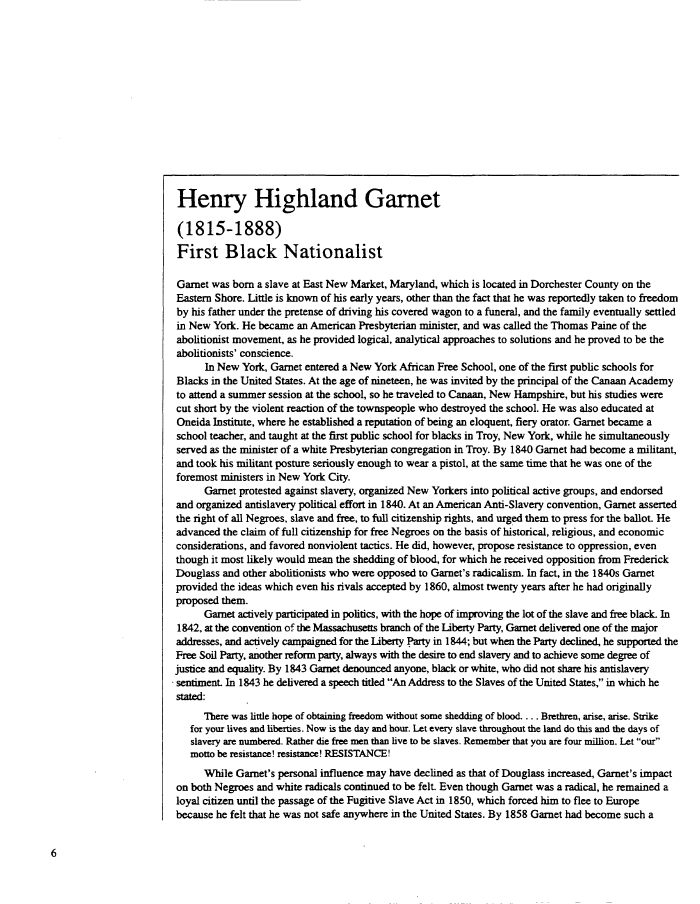 |
||||
|
TASK FORCE TO STUDY THE HISTORY AND LEGACY OF SLAVERY IN MARYLAND (Final Report) 1999/12/31 MdHR 991422 MdHR 991422, Image No: 366 Print image (86K) |
 |
||||
|
TASK FORCE TO STUDY THE HISTORY AND LEGACY OF SLAVERY IN MARYLAND (Final Report) 1999/12/31 MdHR 991422 MdHR 991422, Image No: 366 Print image (86K) |
| Henry Highland Garnet (1815-1888) First Black Nationalist Garnet was born a slave at East New Market, Maryland, which is located in Dorchester County on the Eastern Shore. Little is known of his early years, other than the fact that he was reportedly taken to freedom by his father under the pretense of driving his covered wagon to a funeral, and the family eventually settled in New York. He became an American Presbyterian minister, and was called the Thomas Paine of the abolitionist movement, as he provided logical, analytical approaches to solutions and he proved to be the abolitionists' conscience. In New York, Garnet entered a New York African Free School, one of the first public schools for Blacks in the United States. At the age of nineteen, he was invited by the principal of the Canaan Academy to attend a summer session at the school, so he traveled to Canaan, New Hampshire, but his studies were cut short by the violent reaction of the townspeople who destroyed the school. He was also educated at Oneida Institute, where he established a reputation of being an eloquent, fiery orator. Garnet became a school teacher, and taught at the first public school for blacks in Troy, New York, while he simultaneously served as the minister of a white Presbyterian congregation in Troy. By 1840 Garnet had become a militant, and took his militant posture seriously enough to wear a pistol, at the same time that he was one of the foremost ministers in New York City. Garnet protested against slavery, organized New Yorkers into political active groups, and endorsed and organized antislavery political effort in 1840. At an American Anti-Slavery convention, Garnet asserted the right of all Negroes, slave and free, to fiill citizenship rights, and urged them to press for the ballot He advanced the claim of full citizenship for free Negroes on the basis of historical, religious, and economic considerations, and favored nonviolent tactics. He did, however, propose resistance to oppression, even though it most likely would mean the shedding of blood, for which he received opposition from Frederick Douglass and other abolitionists who were opposed to Garnet's radicalism. In fact, in the 1840s Garnet provided the ideas which even his rivals accepted by 1860, almost twenty years after he had originally proposed them. Garnet actively participated in politics, with the hope of improving the lot of the slave and free black. In 1842, at the convention of the Massachusetts branch of the Liberty Party, Garnet delivered one of the major addresses, and actively campaigned for the Liberty Party in 1844; but when the Party declined, he supported the Free Soil Party, another reform party, always with the desire to end slavery and to achieve some degree of justice and equality. By 1843 Garnet denounced anyone, black or white, who did not share his antislavery sentiment In 1843 he delivered a speech titled "An Address to the Slaves of the United States," in which he stated: There was little hope of obtaining freedom without some shedding of blood.... Brethren, arise, arise. Strike for your lives and liberties. Now is the day and hour. Let every slave throughout the land do this and the days of slavery are numbered. Rather die free men than live to be slaves. Remember that you are four million. Let "our" motto be resistance! resistance! RESISTANCE! While Garnet's personal influence may have declined as that of Douglass increased, Garnet's impact on both Negroes and white radicals continued to be felt. Even though Garnet was a radical, he remained a loyal citizen until the passage of the Fugitive Slave Act in 1850, which forced him to flee to Europe because he felt that he was not safe anywhere in the United States. By 1858 Garnet had become such a |